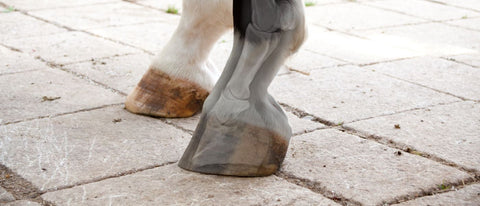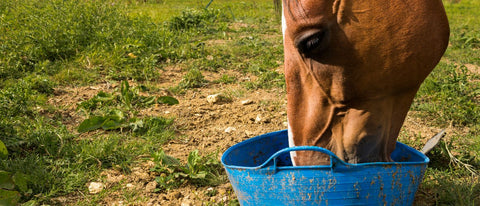
Florian ist aufgewachsen auf einem Bauernhof. Umgeben von Pferden, entdeckte er früh seine Faszination für diese majestätischen Tiere. Inspiriert von seiner reitbegeisterten Mutter, entwickelte er das Nahrungsergänzungmittel - Pferdegold. Seine tiefe Verbundenheit zur Natur und die leidenschaftliche Hingabe zu Pferden trieben ihn an, sein Unternehmen zu gründen.
One morning you notice that your mare is spending an unusually long time at the water trough and is urinating more often than usual.
You also notice changes in her behavior: she seems more tired, her appetite decreases, and her otherwise shiny coat appears dull and lifeless.
These symptoms could have many causes, but they may be early signs of kidney problems in your horse.
It is crucial to be well informed in order to correctly interpret these signs and take timely action, for example through a veterinary examination.
Our guide provides comprehensive information on kidney problems in horses. From renal insufficiency to kidney failure, the spectrum of kidney problems can be broad.
We offer you a comprehensive overview of symptoms, diagnostic options, and treatment strategies. Our goal is to provide you with comprehensive information so you can always provide your horse with the best possible care.

The kidneys and their diverse functions in the horse organism
A horse's kidneys perform essential functions that go far beyond those of a simple filter system.
They are crucial for maintaining chemical balance in the body by not only regulating the balance of water and electrolytes such as sodium and potassium, but also stabilizing the acid-base balance .
These remarkable organs filter blood, remove waste products and play a central role in detoxification .
They also produce hormones that regulate blood pressure and promote the formation of red blood cells.
A well-functioning kidney is therefore crucial for the general well-being and health of your horse.
In order to detect problems early and effectively support your horse's kidney health, it is important to understand how they work and their significance.
Symptoms and first signs
If you recognize the first signs of kidney problems in your horse, you will be able to act quickly and effectively .
Warning signs may include:
-
Changes in drinking habits: Increased or decreased drinking may indicate possible kidney dysfunction.
-
Unusual urination behavior: Differences in the color and amount of urine can indicate kidney problems.
-
General behavioral changes: Lethargy, loss of appetite, and other behavioral changes are possible signs of kidney problems.
Early detection of these symptoms can be helpful in taking appropriate measures and keeping an eye on your horse's health.
It is important to consult a veterinarian if kidney problems are suspected for professional diagnosis and treatment.

Perfect for your horse: Pferdegold® supplementary feed!
These specially developed supplements support your horse's diet and provide it with natural nutrients. Made in Germany, grain-free and drug-free, with a 30-day money-back guarantee.
Try it now!You should pay attention to these behavioral abnormalities
Changes in behavior can be an early sign of kidney problems. Look for apathy, changes in eating habits, or unusual drinking behavior .
Such subtle changes can be signs of a kidney problem and should be taken seriously.
A visit to the veterinarian for accurate diagnosis and treatment can be crucial.
Nutritional tips for horses with sensitive kidneys
An adapted diet can play an important role in supporting horses with kidney problems.
Reducing the protein content in the feed may be advisable, as a high protein load can place additional strain on the kidneys.
It is also important to ensure a balanced supply of electrolytes , especially an appropriate ratio of calcium and phosphorus .
The supply of fresh water should always be ensured to support the kidneys in the excretion of waste products.

Which herbs support kidney health?
Certain herbs can support kidney function. Dandelion, for example, is known for its diuretic effect and can support kidney detoxification.
Other herbs such as nettle and milk thistle may also be beneficial by providing antioxidant properties and supporting metabolism .
Integrating such herbs into the diet can be a useful addition to promote kidney health.
Further nutritional strategies
A well-thought-out nutritional strategy is essential for your horse's well-being, especially when it comes to supporting kidney function.
Here are some basic tips:
-
Adequate water supply: Make sure your horse has access to fresh, clean water at all times.
This is crucial to assist the kidneys in filtering and excreting waste products.
-
Individualized and needs-based feeding: Adapt feeding to your horse's specific needs and health status. A balanced diet is essential for kidney health.
-
Use impeccable & high-quality feed: Choose high-quality feed to optimize nutrient intake and minimize risks from inferior ingredients.
- Reduce potential contaminants: Avoid feed with high levels of contaminants such as mycotoxins, which can be found in spoiled hay or grain.

How much protein should be in horse feed?
Here are some general guidelines on protein content in various horse feeds:
-
Pasture grass: Protein content can vary depending on the growth stage. Young grass often has a higher protein content.
-
Hay: The protein content of hay varies depending on the grass species and harvest time. Early-harvested hay contains more protein than late-harvested hay.
-
Grains: Oats and barley have a higher protein content than corn.
-
Special feed: There are special feed mixtures for horses with kidney problems that have an adapted, lower protein content.
It is important to adjust the protein content in the feed to the individual needs of your horse , especially if it suffers from kidney problems.
A veterinarian or nutritionist can help determine the optimal diet for your horse.
Our product recommendation
All causes at a glance
The causes of kidney problems in horses are varied and can range from environmental factors to nutritional problems.
Understanding the causes can be crucial for taking preventative measures and responding effectively to existing problems .
-
Dietary factors: A high-protein diet can put a strain on the kidneys. Too little or unbalanced food can also impair kidney function.
-
Dehydration: Inadequate water intake can put increased strain on the kidneys, causing them to function less efficiently.
-
Drug influence: Certain medications, especially anti-inflammatories and antibiotics, can damage the kidneys if used long-term.
-
Toxins: The ingestion of toxic substances such as poisonous plants or molds in the feed can lead to kidney damage.
-
Age: As horses age, they may become more susceptible to kidney problems as kidney function declines over time.
-
Genetic predisposition: Certain breeds or individual genetic factors may pose an increased risk for kidney problems.
-
Infections: Infections , both bacterial and viral, can cause inflammation in the kidneys and impair their function.
- Chronic diseases: Other diseases such as Cushing's syndrome or diabetes can indirectly affect kidney function and lead to problems.
Why magnesium deficiency can cause kidney stones
A deficiency of magnesium can lead to a number of health problems in horses , including the development of kidney stones .
Magnesium plays an important role in maintaining healthy electrolyte balance and affects urine concentration.
An imbalance of this mineral can lead to the formation of crystals in the kidneys, known as kidney stones.
Therefore, it is important to ensure a balanced intake of magnesium to minimize the risk of kidney stones.

What does a blood test reveal about possible kidney problems?
A blood count can provide valuable insight into the health of a horse's kidneys.
By analyzing certain values in the blood, veterinarians can draw conclusions about kidney function and possible impairments.
Elevated blood urea levels: a sign of kidney overload?
Elevated blood urea levels can be an indicator of overload or impaired kidney function.
Urea is a waste product of protein metabolism that is normally excreted by the kidneys.
However, if the kidneys do not work efficiently, urea can accumulate in the blood.
This can indicate several problems, including dehydration, excessive protein intake , or kidney disease .
The phases of the disease progression
Kidney diseases in horses often develop gradually and go through different stages .
Each stage has its own characteristics and challenges, and knowledge of them is crucial to acting appropriately.
Here are the four stages and their medical terms, as well as a brief description:
Full Compensation: Stage 1
In the first stage of kidney disease , kidney function is limited but still sufficiently compensated.
The horse does not show any obvious symptoms because the remaining healthy kidney cells can maintain function.
Compensated Retention: The 2nd Stage
At this stage, blood values begin to change, although the horse may not yet show any symptoms .
The kidneys can no longer filter all waste products efficiently, which leads to an accumulation.
Preterminal Stage: The 3rd Stage
During this phase, the reduction in kidney function becomes more noticeable, which can lead to changes in behavior and loss of appetite.
This requires closer monitoring and possibly adjustment of care.
Terminal renal failure: Stage 4
During this phase, kidney function is severely impaired . It is important to work closely with your veterinarian to best support your horse's well-being.
Modern treatment approaches can help improve the horse's quality of life at this stage.

Pferdegold® supplementary feed!
Pferdegold is a small family business from Bavaria with a big dream: to produce the best horse feed. We see ourselves as a family of equestrians who want to provide your horse with the ideal nutrition. 100% natural and perfectly tailored to your horse's needs.
Try it now!Medical therapeutic approaches for chronic kidney disease
Various medical therapies are available for the treatment of chronic kidney disease in horses .
These often include a combination of medications, dietary adjustments, and regular monitoring.
-
Medications can help relieve symptoms and support kidney function.
-
A specially adapted diet rich in essential nutrients while controlling protein and phosphorus levels may also be essential.
- Regular veterinary examinations are essential to monitor the progression of the disease and adjust therapy if necessary.

Kidney problems: First aid tips and quick help
If signs of kidney problems appear , swift action is required. Immediate measures include ensuring adequate water intake and avoiding stress for the horse.
If you suspect kidney problems, you should contact a veterinarian immediately.
Until the veterinarian arrives, it's important to calm the horse and keep the environment as comfortable as possible. Avoid administering any medication without first consulting your veterinarian, as some medications could place additional strain on the kidneys.
Signs and measures for kidney inflammation
Kidney inflammation in horses often manifests itself through symptoms such as lethargy (weakness), fever, changes in urination behavior and loss of appetite.
If kidney inflammation is suspected, it is crucial to consult a veterinarian immediately.
Treatment for kidney inflammation in horses may include antibiotics and anti-inflammatory medications, depending on the cause of the inflammation.
It is equally important to ensure a balanced diet and adequate hydration to support kidney function and promote recovery.
Conclusion
Kidney problems in horses can be complex and challenging, but with the right knowledge and approaches, they can often be managed.
It is important to recognize the signs of kidney problems early, adjust the horse's diet and seek medical help if necessary or uncertain.
Close cooperation with your veterinarian, coupled with careful care and a balanced diet, plays a key role. With the information in this guide, you'll be well-equipped to be there for your horse at all times and provide support.
FAQ
Can a horse with kidney problems still be ridden?
The decision to ride a horse with kidney problems depends largely on the horse's health and the stage of the disease.
In mild cases and with veterinary approval, light riding may be possible, but you should always consult a veterinarian. It's also important to observe the horse carefully and stop training immediately if it shows any signs of discomfort.
Which breeds or age groups are more prone to kidney problems?
There are no specific breeds that are generally more susceptible to kidney problems, but older horses may be more frequently affected.
As with any health problem, individual factors such as genetics, diet and lifestyle can play a role.
How long does a horse live with kidney failure?
The life expectancy of a horse with kidney failure depends largely on the stage of the disease and the effectiveness of treatment.
With early diagnosis and appropriate treatment, horses with kidney failure can lead relatively normal lives. The key is careful monitoring and continually adapting care to your horse's needs.
IMPORTANT:
Pferdegold is not a substitute for veterinary diagnosis or treatment . The information contained in this article is for general informational purposes only and is intended to help improve your horse's well-being.
Pferdegold products do not treat or cure diseases , but rather support your horse in correcting nutritional deficiencies through targeted nutrient intake. However, they are not a substitute for professional advice from a veterinarian or specialist.
If your horse has any health problems, we strongly recommend consulting a veterinarian . Pferdegold assumes no liability for decisions made based on the information provided here.
Learn more about essential nutrients for horses!
- Feeding horses optimally and naturally » That 's what matters!
- Calcium for horses: strengthening bones and muscles
- Manganese for horses: The importance in horse nutrition

















